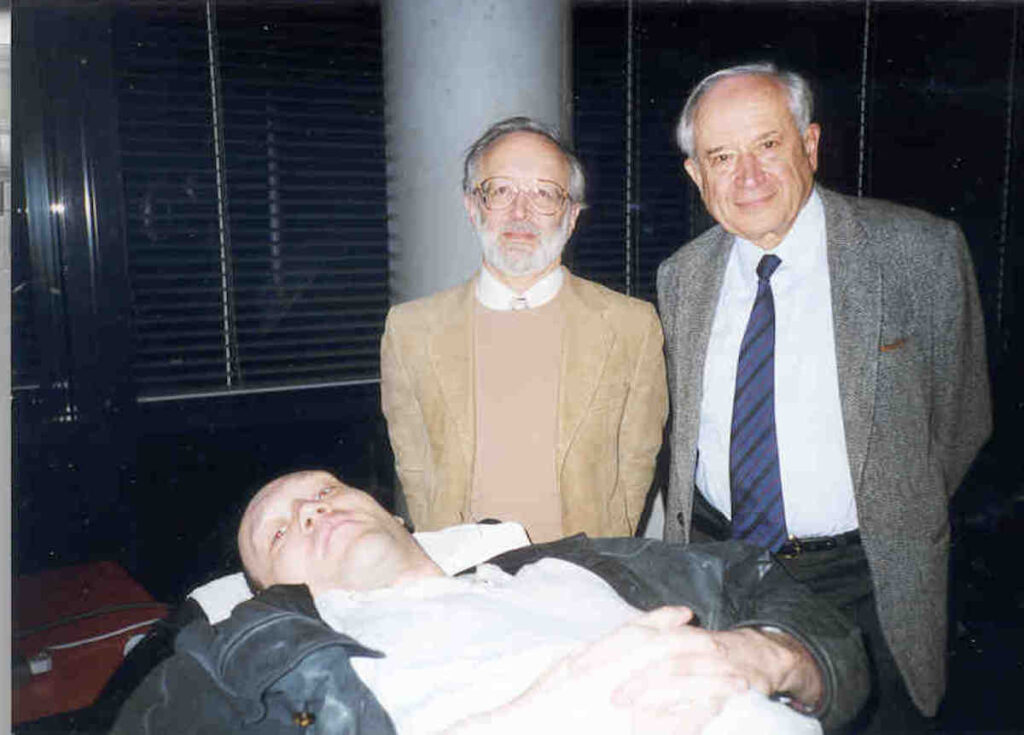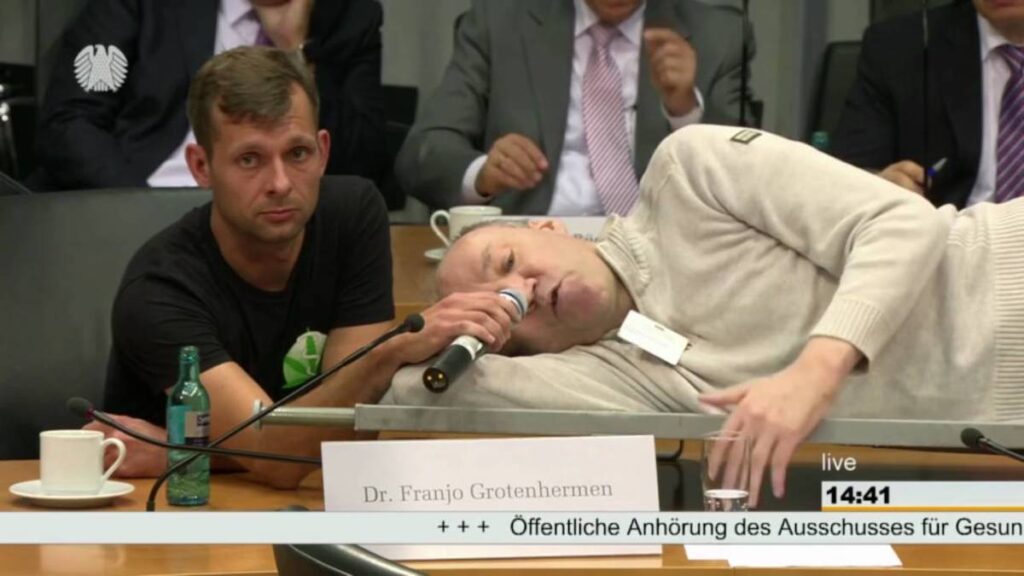The founder of the International Alliance for Cannabinoid Medicine (IACM), Dr Franjo Grotenhermen is one of the world’s leading experts in the field of cannabis medicine. But his own personal health battles are just as remarkable.
Dr Franjo Grotenhermen is not your typical doctor.
Having worked alongside Raphael Mechoulam, Lester Grinspoon and Roger Pertwee, he is among those who will be remembered as pioneers of cannabis medicine and has played a not insignificant role in the reform of cannabis laws in his home country, Germany.
But while these professional achievements have rightly earned him great acclaim, his experience as a patient is just as significant.
Grotenhermen was working as a medical doctor in a busy hospital in Germany in 1988 when he began experiencing health problems.
He would have what he describes as “attacks” and bouts of orthostatic hypotension, a significant drop in blood pressure which usually occurs within a few minutes of standing and is common in patients with heart failure.
He became too ill to work, but no one could pinpoint the cause.
“My condition is quite strange,” he says.
“It is difficult to detect, or to see the reason for it. This was a difficult period in my life, where I had health problems, but nobody could find any objective parameter of what was wrong.”
It took 18 months and countless doctors appointments before he was eventually diagnosed with small vessel disease at the age of 33.
Small vessel disease is a condition in which the walls of the small arteries in the heart don’t work as they should, reducing the flow of oxygen-rich blood to the heart. It can cause chest pain (angina), shortness of breath, and other signs and symptoms of heart disease, although like many chronic conditions, it affects individuals in different ways.
In 1990, Grotenhermen experienced a major attack after which he would be forced to spend the rest of his life in bed, or at least lying down.
“It is not so that every patient with this disease has to lie in bed,” he says.
“My condition is rather rare in that it is expressed this way.”
Over the years he has learned to live to the tune of his body’s rhythms. His condition is worse in the morning, so then he rests, but in the afternoon he is able to work and see patients.
In the evening around 6pm, inexplicably, he is able to stand for up to 90 minutes. But he must keep moving (he becomes ill if he stands still) and stick to the schedule like clockwork.
No one knows why it is this way, not least Grotenhermen, but he has learned to accept that it just is.
“I cannot explain everything that’s happening to me and why it is the way it is,” he explains.
“I just have to accept it because if I don’t follow the time rules and the daily rhythm of my life, I get worse.
“The last time I stood up before 6pm it was 1994 and this resulted in a dramatic deterioration of my health, simply because I stood up at 5pm and not at 6pm. I developed severe heart problems and never regained my health as I was before… just by going a little bit against my rhythm.”
With a chuckle, he adds: “It’s always very strange when I go to conferences and give my talk lying down, and then at a certain time I stand up, surprising everyone. I’m sure people are wondering what is going on.”

(From left) Franjo with Roger Pertwee and Raphael Mechoulam at the IACM conference in Cologne, 1998.
A new reason to live
Now 66, Grotenhermen has spent equal amounts of time living a “healthy life” and a “not-so healthy life”, as he puts it.
“When I got the diagnosis and looked into the future, I didn’t know whether I would turn 50 or 60,” he says. “It’s unbelievable that I continue to live.”
But it wasn’t the life that he had expected.
“I wanted to be a doctor, but my plans were completely finished,” he says.
“I tried to find a new reason to live.”
It didn’t take long. In 1993 he was contacted by an old acquaintance, Michael Carus [founder of the nova-Institute], a physicist who was working with fibre hemp and looking for scientific input on a paper he was writing about its drug abuse potential.
This led to another opportunity, in 1994, to write a second chapter of Marihuana, the Forbidden Medicine, by Dr Grinspoon for its publication in Germany.
“I thought this was an interesting topic because in Europe nobody was talking about it,” says Grotenhermen.
“But I was very impressed by the therapeutic potential. Since there was nothing in Germany, I decided to write a review on the current knowledge of cannabis as medicine. Some months later, people were starting to call me a cannabis expert—which I was not— but nobody knew anything and I knew a little bit.”
In 1997, he founded the German association, Arbeitsgemeinschaft Cannabis als Medizin e. V. (ACM) and began to write a regular newsletter highlighting the latest research in the field.
He was soon being contacted by experts from overseas, which led to the first international conference and the establishment of the IACM.
“I invited Roger [Pertwee] and Raphi [Mechoulam] and Lester [Grinspoon] to our first conference in 1998 and we began to work on an international basis.”
Having now written hundreds of articles on cannabis as a medicine, exploring everything from its use in various indications, to the side-effects and modes of administration, Grotenhermen can now confidently call himself an expert.
“It was interesting for me for three reasons,” he says of his work in the field.
“It meant I could work with patients again, they could reach me and I could advise them how to use it and so on; I’m interested in science and research and this was in the 1990s when the discovery of the ECS [endocannabinoid system] was just coming out, so it was fascinating on several levels; and I was always very politically active and I saw that something had to be done on a political scale—there had to be law changes, there was so much work to do.”

Giving evidence at an expert hearing of the Health Committee, German Bundestag, 2016.
The patient perspective
The ACM played a fundamental role in the legislative change to allow certain patients an exemption to be prescribed cannabis for a limited number of conditions in 2005, before it was expanded in 2016.
After realising that few doctors were actually willing to prescribe, in 2012 Grotenhermen began practising medicine again for the first time since 1990.
Despite the lack of robust scientific studies on cannabis which prevented many clinicians from taking it seriously as a medicine, Grotenhermen’s own health battles gave him a different perspective.
“I’m not the one waiting for large placebo-controlled studies with 200-300 patients for every indication,” he says.
“I simply decided to take the experiences of patients seriously. I speak to my patients from expert to expert, because they have become an expert on their disease.”
Being a patient himself has given Grotenhermen a level of empathy and understanding that, sadly, modern medical systems rarely allow for.
“What I’m experiencing with my disease is completely unusual. I have met so many doctors who didn’t believe that it is as it is, or that it’s a psychosomatic illness. I wanted to be taken seriously and I realised that many patients have similar experiences.
“When I worked as a doctor in a hospital, I thought that I was empathetic and it was important for me to be a doctor who listened to their patients. But being a patient [myself] changed something.
“When Raphi and I founded the IACM, we said the centre of our work is not cannabis, the centre of our work is to bring an optimal treatment to patients and to give them another possibility.”
The 13th IACM Conference on Cannabinoids in Medicine will take place online from Friday 12 – Saturday 13 April, with renowned speakers including Dr Ethan Russo, Dr Kirsten Müller-Vahl and Dr Bonni Goldstein, as well as chair of the IACM Patient Council, Carola Perez.
The agenda will explore topics such as cannabis medicine around the globe, benefits and risks in psychiatric illness, and its use in paediatrics.
“We want to bring scientists, doctors and patients together, to exchange ideas and hopefully have some impact,” he adds.
“It was, I think, lucky that I fell ill, because otherwise I wouldn’t have come to cannabis.”
You can see the full agenda and register for the IACM Conference here
The Doctor, a documentary about Grotenhermen and his work was released in 2022.
The post Dr Franjo Grotenhermen: “Cannabis gave me a new reason to live” appeared first on Cannabis Health News.
Go to Source
Author: Sarah Sinclair

